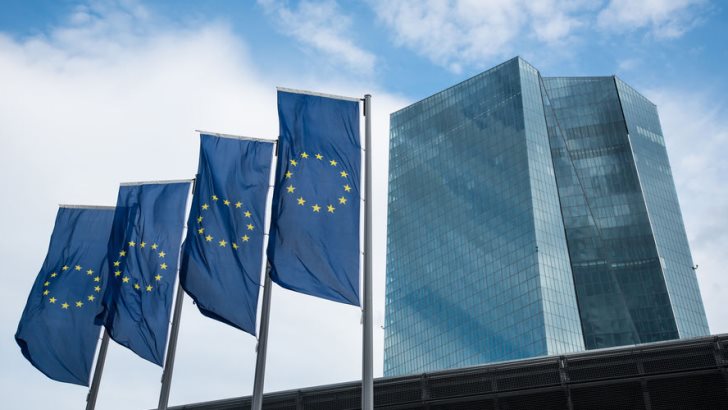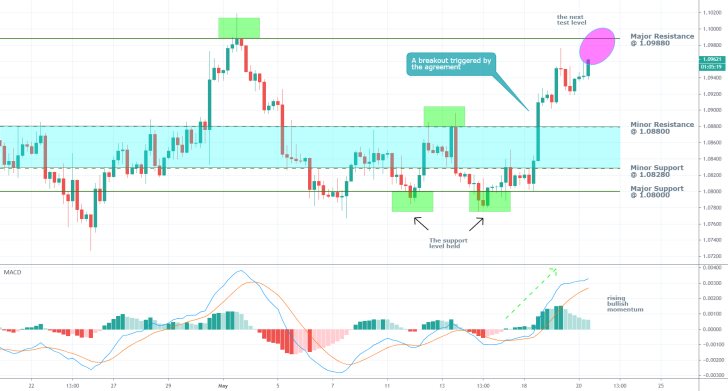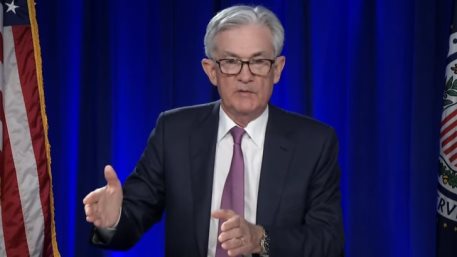
Two days ago, French and German political leaders announced comprehensive plans for their mutual collaboration in mitigating the economic fallout from the coronavirus pandemic.
The European Commission will raise 500 billion euros, which are going to be injected into the European capital markets to support and stimulate the devastated companies and sectors.
The news is important for two prime reasons. Firstly, this financial support is going to be injected into the broader European economy in a new form, which is going to bolster the liquidity from the ECB's relief package that was already advanced in the wake of the crisis.
Consequently, the overall response to the crisis is going to become much more diversified and far-reaching, which is going to make the European economies much better suited for tackling the continually developing uncertainties, rather than merely bolstering the aggregate money supply.
This would alleviate some of the strain off the ECB's shoulders, as up until now the Bank has been the sole major player in the combat against the economic fallout. Subsequently, the ECB can now focus on resolving the recent issues with its asset-purchasing programs, which were raised by the German Constitutional Court.
Secondly, an accord between French President Emmanuel Macron and German Chancellor Angela Merkel means that in its capacity as a political organisation, the European Union remains cohesive and stable.
Now there is a clear and concise roadmap at the top tiers of European policymaking for navigating the uncertainties of the coronavirus crisis, which was lacking until recently.
Previously there were fears of division as European leaders struggled for a long time to reconcile a common stance on the hot topic of shared debt.
The primary issue was encompassed by the fears of the fiscally-responsible northern states, that by agreeing to share the burden of the coronavirus fallout with the more fiscally-irresponsible southern states by means of issuing the so-called coronabonds, they would also have to pay the price for the latter's previous mishandling of debt.
Such disagreements have evidently been resolved as Germany, which was stringently opposed to the proposition in the past, has now agreed to pursue a common strategy with its European partners.
Consequently, European stocks and the bloc's common currency jumped on the renewed investors' optimism.
The EURUSD has finally managed to break out above the minor resistance level at 1.08800 and is currently gaining bullish momentum as it nears the next crucial test – the major resistance level at 1.09880.

Trendsharks Premium
Gold is undergoing a correction, as investors take profits to offset losses from falling stock prices, impacting their margins. However, we anticipate a renewed wave of [...]
The Swiss stock market index is mirroring its global counterparts, such as Germany 40 and US100, experiencing a sharp decline following the announcement of new [...]
We’re analyzing the weekly chart to grasp the broader market trend. Over the past three years, the US30 index has surged by 17,000 points, often resembling a nearly straight [...]
Over the past week, the DAX has experienced a sharp decline, plunging by an astonishing 3,400 points. This downward movement is not isolated, as its international counterparts, such as the UK100 and US100, are also facing significant [...]
EURUSD recently formed a double top at 1.0930, signaling a potential trend reversal, and has since begun a correction. After a 600-pip rally since early March, a pullback at this stage is both expected and healthy. Given these conditions, we are placing a [...]
Since early March, EURJPY has surged nearly 1,000 pips, providing us with several excellent trading opportunities. However, as the rally matures, many early buyers are beginning to take profits, leading to a noticeable slowdown in the uptrend. On Friday, the pair formed a [...]
The AUDJPY currency pair continues to be dominated by bullish momentum, as multiple golden cross patterns reaffirm the strength of the ongoing uptrend. Despite this, we are witnessing a much-needed [...]
The EURAUD currency pair appears to be undergoing a trend reversal, signaling a potential shift in market direction. A notable technical development is the formation of a Death Cross on the chart, a widely recognized bearish indicator that typically suggests a [...]
After securing an impressive 200-pip profit last week, the EURJPY currency pair is now undergoing a southward correction, retracing some of its recent gains. Despite this temporary pullback, the Golden Cross remains intact, reinforcing our view that the overall trend continues to be [...]
The appearance of a Golden Cross in Silver strengthens our analysis that the metal is currently in a strong uptrend, indicating further bullish momentum in the market. This technical pattern, where the short-term moving average crosses above the [...]
This trade presents a considerable level of risk and can be classified as an opportunistic move based on recent price action. The GBPUSD currency pair has experienced a substantial bullish rally, surging by nearly 500 pips in a strong upward movement. However, after this extended period of appreciation, the pair is showing signs of a potential [...]
The anticipated Death Cross on the SMI20 appears to be failing as price finds strong support at the 23% Fibonacci retracement level. After testing this area, the index has shown bullish strength, printing several large green candles, signaling an increase in [...]
A Golden Cross has just appeared on the USDJPY chart, signaling a potential bullish move. This technical pattern occurs when the 20 period moving average crosses above the 60 period moving average, a widely recognized indication of increasing [...]
After 2 months of a down trend, we finally see some indications of price recovery for Oil. The golden cross, a historic buy signal, supports this [...]
For the past month, the German DAX40 has experienced a remarkable 10% surge, reflecting strong bullish momentum. Despite ongoing market volatility and frequent pullbacks, every dip continues to attract fresh buyers, reinforcing the [...]
Oil continues its downward trajectory, despite occasional pullbacks. The overall trend remains bearish, reinforced by multiple Death Cross patterns, a classic sell signal indicating further weakness. Adding to this bearish outlook, the critical [...]
Over the past few days, gold has experienced a sharp decline of more than $100. This downturn can be attributed in part to traders securing profits to manage their margins, which are under strain due to the significant drop in major indices. Currently, gold has fallen below the [...]
The NASDAQ 100 index is showing strong bullish momentum, as evidenced by the formation of a Golden Cross on the chart. This classic buy signal occurs when the short moving average crosses above the long term moving average, suggesting that upward momentum is [...]
The EURAUD currency pair has encountered a significant resistance level, failing to break above the critical 61% Fibonacci retracement level. This suggests that bullish momentum is weakening, reinforcing the case for a potential downward move. Given this technical setup, we favor entering a [...]
The UK100 is experiencing a remarkable rally! Over the past few weeks, the British stock market index has surged nearly 800 points. Each minor dip has attracted more buyers, fueling the bullish momentum. However, since last week, we’ve observed a slight [...]




















